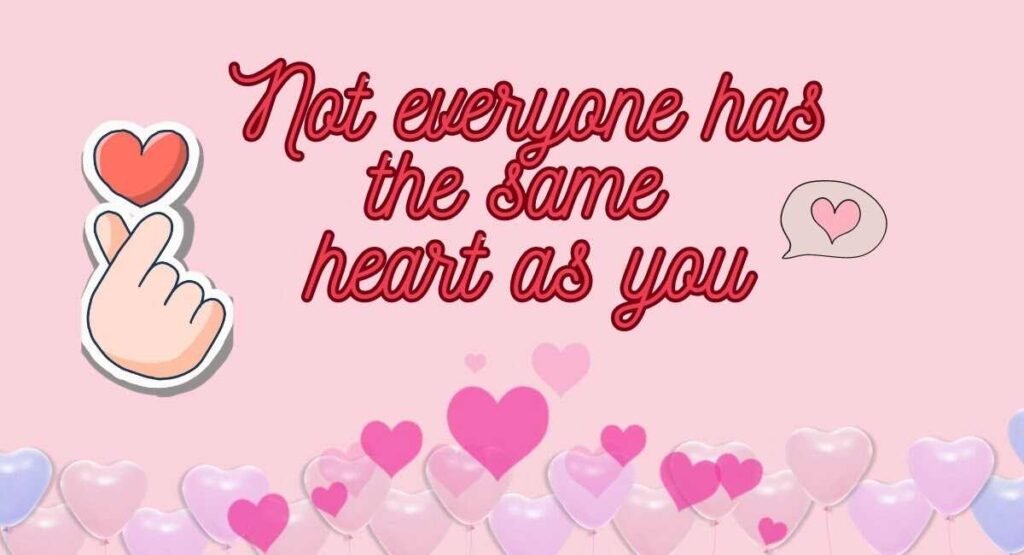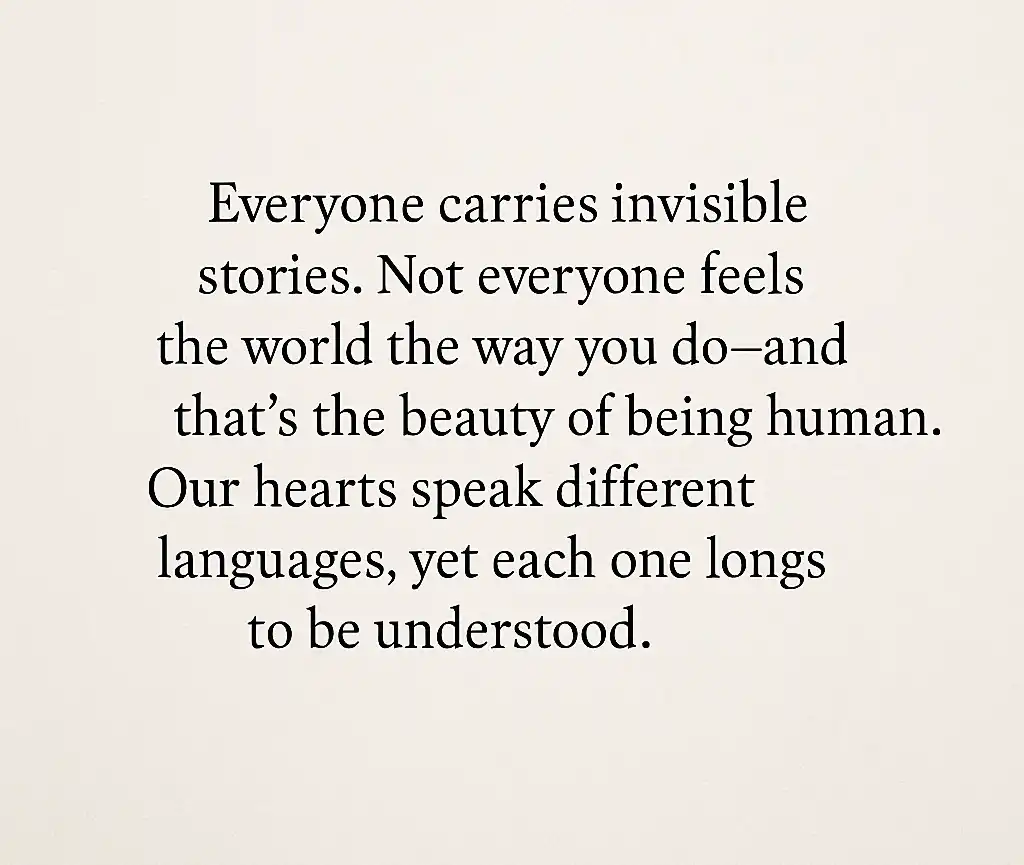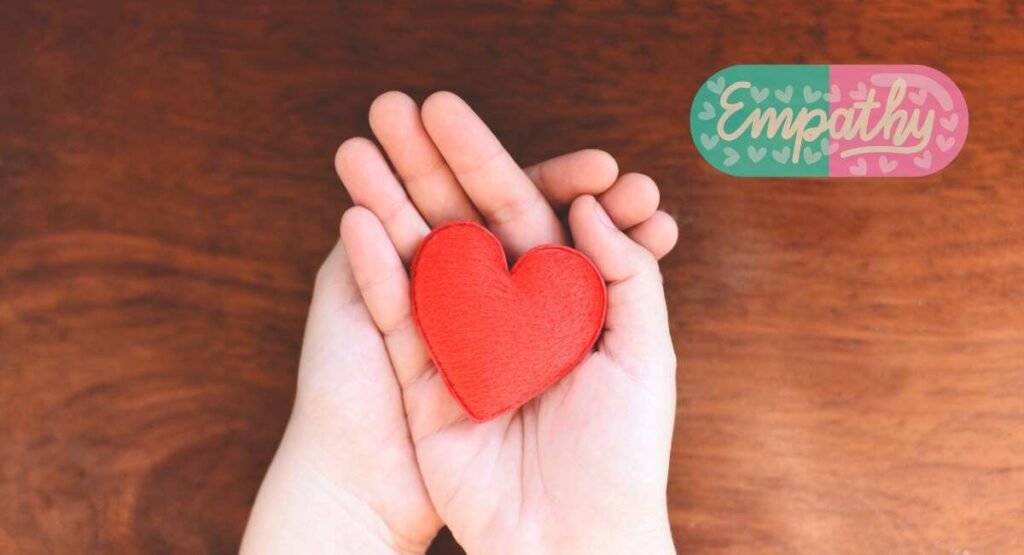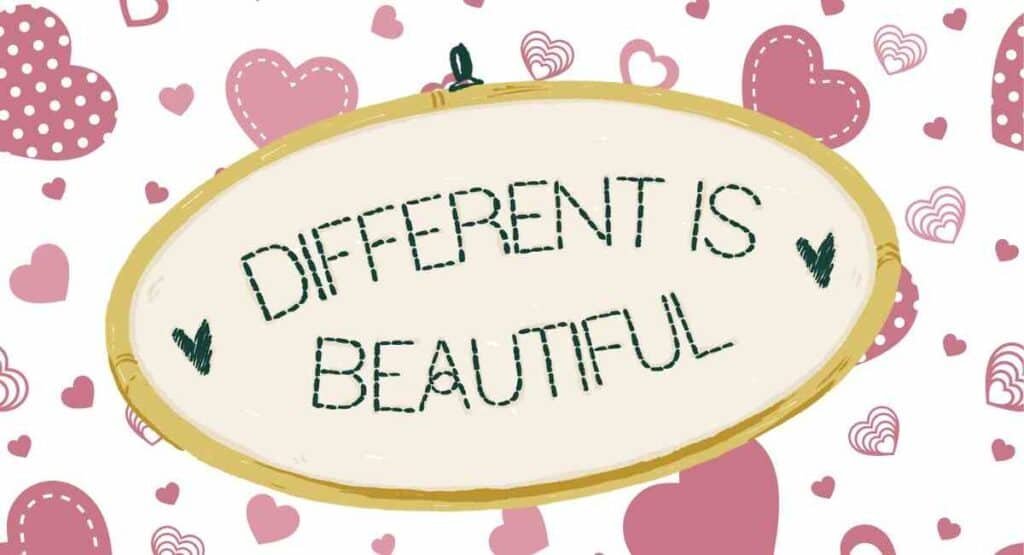Have you ever wondered why not everyone has the same heart as you?
Find out why it’s important to be aware of the differences in others and how you can embrace them.

Not everyone has the Same Heart as You Meaning?
Not everyone has the same heart as you means people have different views and experiences.
This reveals who we are as humans.
Notice, appreciate, and empathize.
Listening actively builds connections in a diverse world.
Why not everyone has the Same Heart as You?

Not everyone has the same heart as you, and that’s perfectly fine.
People have different views, experiences, values, and beliefs that shape their hearts.
The world we inhabit is incredibly different, and that is terrific.
However, it can lead to disagreements or misunderstandings when connecting with others.
We all experience love, sadness, anger, and joy.
How we process and express these feelings can vary greatly from person to person.
Knowing this basic distinction can make it easier for us to interact with others with greater compassion and empathy.
To create a kinder and more inclusive society, we should try to understand and appreciate the different viewpoints and reasons of others.
Recognizing the Multifaceted Nature of Hearts
Our emotional responses and mindsets are heavily influenced by:
- Personal experiences and upbringing
- Individual temperament
- Cultural conditioning
- Social environment
- Past relationships
These factors weave a complex web of beliefs, biases, and reactions, defining how we see the world.

Realize that not everyone perceives the world the same way you do.
This recognition sets the stage for developing empathy and understanding.
For instance, a person who grew up in a hostile environment may develop a closed heart, building protective emotional barriers.
They might struggle with trust issues and find it difficult to connect with others on an emotional level.
On the other hand, someone who has grown up with love and positivity displays a natural openness to others.
They naturally radiate warmth and easily form deep bonds with people.
Different emotional expressions manifest through:
- Varying communication styles
- Unique ways of processing feelings
- Distinct comfort levels with vulnerability
- Personal approaches to conflict resolution
Recognizing that everyone’s heart is unique, we can approach interactions with an open mind.
We may indicate our commitment for assimilating new information.
Rather than expecting everyone to think and feel the same way we do, we can embrace the diversity of perspectives.
We gain a deeper understanding of the human experience.
The multifaceted nature of hearts also extends to our behavioral patterns.
While some people tend to be more introverted, others are more outgoing.
The Power of Empathy
Empathy is a strong human emotion that enables us to establish closer relationships with others.
You can understand their feelings, thoughts, and experiences, even if you have not personally experienced their situation.

It is the core of sentiment and human connection.
Empathy allows you to evaluate another person’s situation and put yourself in their position.
Compassion serves as a bridge between different hearts by:
- Enabling perspective-taking
- Fostering genuine connections
- Building trust and understanding
- Creating safe spaces for expression
However, it’s important to remember that not everyone has the same heart as you do. Not everyone possesses this quality.
Some individuals are more self-centered or lack emotional intelligence.
Some people may have trouble expressing their feelings or identifying them in others.
Other factors to consider are temperament and upbringing.
Through empathy, we may engage with others and transcend our limited perspectives.
It requires active listening, genuine curiosity, and a willingness to suspend judgment.
When we practice empathy, we develop a profound appreciation for the diversity of hearts around us.
We create a safe space to share thoughts and feelings.
Trust is built, and relationship is strengthened.
This understanding enables us to respond with kindness, respect, and support even when confronted with conflicting perspectives.
In addition, empathy enables us to respond more effectively when someone is in trouble or facing challenges in their life.
People also read:
Shoonya Meditation: A Step-by-Step Guide
Failing to Plan is Planning to Fail: What You Need to Know
Nurturing Empathy in a Diverse World
To nurture empathy, listening actively and showing genuine curiosity is important.
We can gain insight into others’ unique stories and experiences.

This involves giving our full attention to the person we are talking to, maintaining eye contact, and being fully present.
Active listening aids in our grasp of sentiments and motivations behind a person’s words, leading to a deeper level of compassion.
Genuine interest plays a vital role. We pose open-ended inquiries.
We try to comprehend different viewpoints.
Curiosity enables us to explore the world through the eyes of others.
It broadens our horizons and enhances our capacity for kindness. Positive sensations are evoked.
In addition to active listening and fascination, we expose ourselves to pluralism, busy in meaningful conversations and exploring literature and art from various backgrounds.
We question our preconceived notions and break down our assumptions.
Holding off on judgment helps us understand without jumping to conclusions.
Validating others’ experiences shows we respect their feelings and perspectives.
These practices deepen empathy and promote mutual respect.
Overcoming Challenges in Understanding
Understanding is a fundamental aspect of human interaction.
Despite our best intentions, understanding and empathizing with others can sometimes be difficult.
Not everyone has the same heart as you, which can create significant communication barriers.
You may encounter:
- Language barriers
- Cultural misunderstandings
- Varying emotional expressions
- Different communication styles
To overcome these hurdles, we can pay attention not only to the words spoken but also to nonverbal cues, tone of voice, and body language.
It’s critical to enter discussions with a receptiveness and a sincere desire to absorb knowledge from others.
Overcoming biases and prejudices is among the most difficult aspects of understanding.
We all have our own set of assumptions about the world around us.
Personal bias can cloud our judgment and impair our ability to relate with others.
These prejudices prevent us from truly seeing another person’s perspective.
Self-reflection, humility, and a willingness to challenge our preconceptions are basic requirements.
Education and the search for different thoughts mold and expand our understanding.
Another difficulty is navigating cultural differences.
Our cultural backgrounds also influence how we communicate and interpret messages.
To bridge these gaps:
• Pay attention to non-verbal cues
• Recognize ethnic variances
• Practice cultural sensitivity
• Maintain open-mindedness
• Avoid assumptions
• Seek clarification when needed
Benefits of Embracing Differences
If we accept that not everyone has the same heart as we do, it doesn’t mean that their outlook or values are less important than ours.
Rather, we tap into a multitude of benefits.

Embracing differences is a vital aspect of living in a diverse society.
Acceptance of differences fosters creativity and innovation.
When people from various backgrounds and experiences join together, they each provide a distinctive viewpoint to the problem-solving process.
These days different media platforms also helps in providing knowledge about diverse cultures.
Diverse perspectives allow us to approach complex problems from different angles and create a more robust and resilient world.
Valuing disparities facilitate us to admire the richness and complexity of the human experience.
It promotes mutual respect, reduces conflict, and strengthens relationships.
When we take the time to learn about different cultures and beliefs, it extends our insights.
It encourages us to celebrate diversity rather than fear it.
Honoring our contrasts can lead to a more inclusive and peaceful society.
This inclusivity opens the doors to new ideas, collaboration, and growth.
Conclusion
In conclusion, it is important to remember that not everyone has the same heart as you.
We all have varied origins and events that frame our views and practices.
Instead of expecting others to be like us, we should acknowledge and respect differences to nurture an inclusive society.
This may require patience and empathy, but cultivating a sense of belonging and approval can result in a more unified community.
We can build bridges of connection and compassion by recognizing the rich depths of hearts, nurturing sensitivity, overcoming challenges, and appreciating diversity.
Level up your awareness by:
• Showing empathy every day
• Exploring different perspectives
• Questioning your own assumptions
• Making room for all kinds of emotions
Let us celebrate the beauty of our differences and strive to create a world where empathy thrives, diversity is celebrated and brings us closer together.
Not everyone has the Same Heart as You Quotes
“Life is a masterpiece painted with diverse hearts. Embrace the masterpiece, for not everyone has the same heart as you.”
– Christopher Adams
“Our individual hearts compose the symphony of life; recognize and honor that not everyone has the same heart as you.”
– David Turner
“Our hearts beat in the rhythm of individuality; not everyone has the same heart as you.”
– Jane Doe
“Cherish the melody of diversity, for not everyone has the same heart as you. It’s in the harmonies of differences that we find true unity.”
– Michael Anderson
“The beauty of humanity lies in its diversity of hearts. Not everyone has the same heart as you, and therein lies our shared strength.”
– Emily Williams
“In the tapestry of existence, each heart is a unique thread. Embrace the differences, for not everyone has the same heart as you.”
– Sarah Johnson
“Cherish the melody of diversity, for not everyone has the same heart as you. It’s in the harmonies of differences that we find true unity.”
– Michael Anderson
“Diversity is the palette of life; celebrate the fact that not everyone has the same heart as you.”
– John Smith
“In the garden of humanity, the blossoms of uniqueness make the landscape vibrant. Not everyone has the same heart as you, and that’s the poetry of existence.”
– Lily Chen
“The kaleidoscope of perspectives forms the mosaic of our shared journey. Remember, not everyone has the same heart as you.”
– Rachel Bennett
“True unity is found in acknowledging the myriad of hearts that beat in our midst. Appreciate the differences, for not everyone has the same heart as you.”
– Marcus Foster
Pretty! Thiss was an incredibly wonderful article.
Thanks for providing these details. https://evolution.org.ua/
Pretty! This was an incredibly wonderful article. Thanks for providing these details. https://evolution.org.ua/